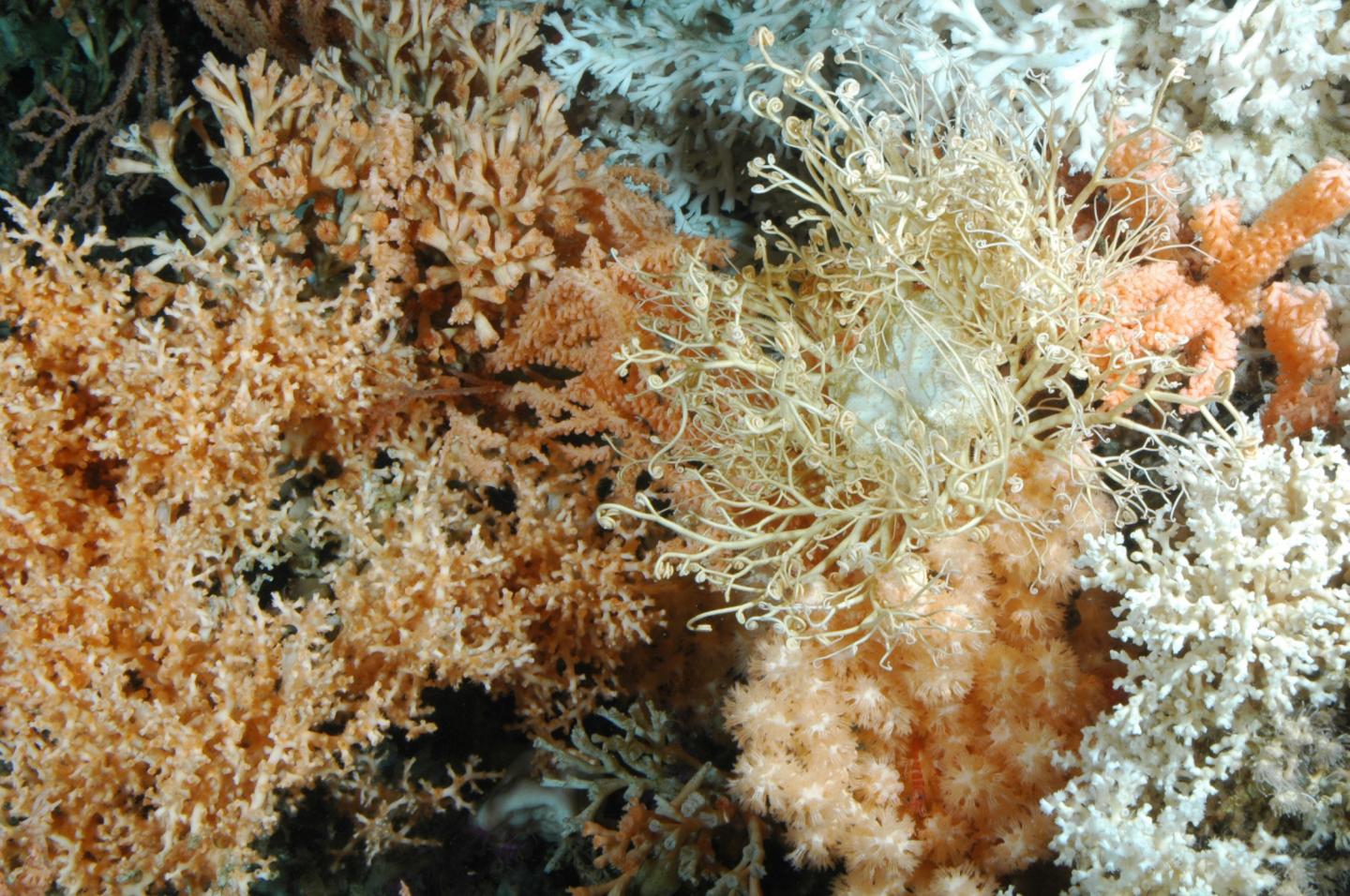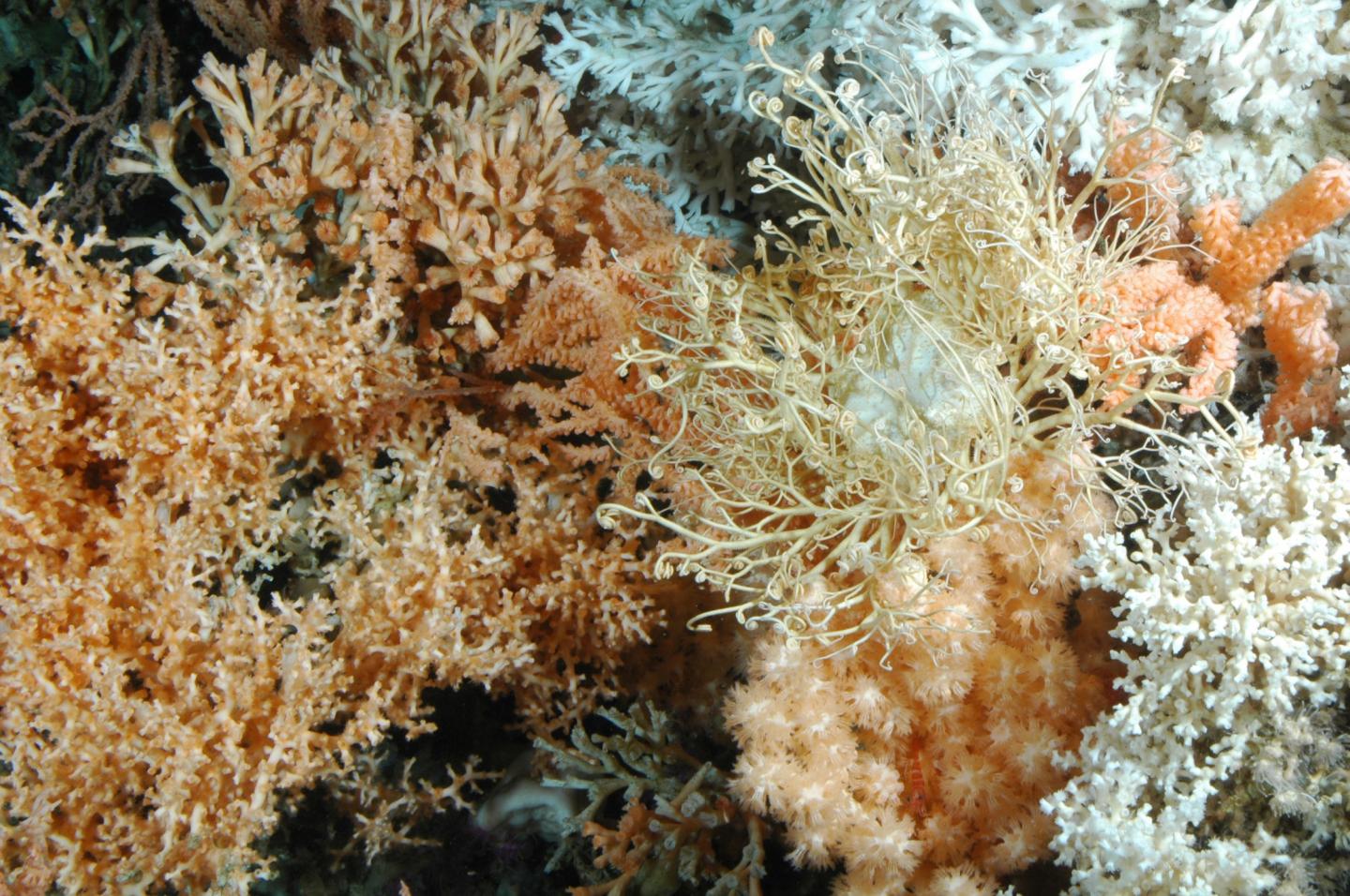
Credit: Photo: JAGO-Team, GEOMAR
Because they build their skeletons from calcium carbonate, cold-water corals such as the globally distributed species Lophelia pertusa are considered particularly threatened by ocean acidification. This change in seawater chemistry, caused by the absorption of carbon dioxide (CO2) from the atmosphere, reduces the concentration of carbonate ions. With fewer carbonate ions, calcification becomes more difficult. However, laboratory studies at GEOMAR Helmholtz Centre for Ocean Research Kiel reveal, that a simultaneous increase in water temperatures could help Lophelia pertusa to counteract negative effects of ocean acidification. The experiments that were conducted as part of the German research programme on ocean acidification BIOACID (Biological Impacts of Ocean Acidification) demonstrate how important it is to investigate Lophelia's response to single drivers of climate change as well as their combined effects.
On an expedition with the research vessel POSEIDON and the submersible JAGO, marine biologists from GEOMAR collected corals at Trondheim Fjord (Norway) for their investigations. "During our JAGO dives, we examined the condition of the reefs. We documented their expansion and the diverse community living in the reefs and carefully chose our samples", explains Janina Büscher. The PhD student from the department of Biological Oceanography at GEOMAR conducted the experiments and is lead author of a publication on the effects and impact of ocean acidification and warming on the growth and fitness of Lophelia pertusa in the research journal Frontiers in Marine Science. "The richness in species of these reefs that exist in almost complete darkness and at temperatures below ten degrees Celsius is very impressive." Many of these underwater oases, grown over centuries, are protected as natural heritages. Their diversity ensures the resilience of the fjord ecosystem, and many species of fish find shelter and food in the reefs.
To find out more about the future of the corals, the biologists from Kiel kept Lophelia pertusa colonies at the GEOMAR laboratories for six months. The water in some of the test aquaria was held at eight degrees Celsius just like in the Norwegian reef, others were elevated to twelve degrees. The CO2 concentration was either set to the current values of 400 micro-atmospheres or to 800 micro-atmospheres, which are expected for the end of this century. In addition, the amount of food was altered. Some of the corals received ten times as much food than those in the respective control treatments.
Monthly measurements and final analyses showed: Under more acidified conditions and unchanged temperatures, the corals grew slower, regardless of the food supply. But when acidification was combined with elevated temperature, they developed at about the same rates as under today's CO2 concentrations and water temperatures. The tenfold increase in food supply benefitted the corals only if just one of the parameters was increased. When both parameters were changed, they seemed to be unable to take up the additional food. "The elaborate experimental setup shows that when applied in combination, different climate change drivers can interact in their effects on the corals. While in this specific case they compensated each other, at higher temperatures they may amplify each other, as we know from studies on other calcifying organisms", says Janina Büscher.
Depending on the extent at which the ocean acidifies in the course of climate change and which water temperatures the corals experience, their overall reaction could be less neutral than observed in the experiment, the GEOMAR team assumes. In addition, other factors not investigated so far, such as eutrophication and pollution, can further amplify the corals' sensitivity to climate change. Another cause for concern is that the unprotected lower parts of the Lophelia stocks, which form the foundation of the reefs, are directly exposed to seawater and can therefore be corroded by acidifying waters.
"In our experiments we have seen how flexible Lophelia pertusa reacts and how different factors influence each other. The fact that they are able to attenuate each other under certain conditions could be reason for hope. But we know far too little to give an all-clear", says Janina Büscher. Currently, the researchers are trying to identify critical thresholds for acidification and warming based on recent studies. They suspect that Lophelia pertusa will only benefit from rising temperatures as long as they stay within the limits that this species is currently experiencing in its distributional range. In many regions, however, they are already at their temperature limit. If temperatures continue to rise, the compensatory effect observed in this study could turn negative, amplifying the effect of ocean acidification. Despite many questions remaining unanswered, the scientists urge: "If we wait for more detailed insights before we mitigate climate change, it may be too late to preserve the cold-water coral reefs."
###
Original publication:
Büscher, J.V., Form, A.U. And Riebesell, U. (2017): Interactive Effects of Ocean Acidification and Warming on Growth, Fitness and Survival of the Cold-Water Coral Lophelia pertusa under Different Food Availabilities. Frontiers in Marine Science 4: 101. doi: 10.3389 / fmars.2017.00101
BIOACID in brief:
Under the umbrella of BIOACID (Biological Impacts of Ocean Acidification), 10 institutions examine how marine ecosystems react to ocean acidification, how this affects the food web and the exchange of material and energy in the ocean and how the changes influence the socio-economic sector. The project is funded by the Federal Ministry of Education and Research (BMBF) and coordinated by GEOMAR Helmholtz Centre for Ocean Research Kiel. A list of member institutions and further information can be found at http://www.bioacid.de.
Links:
http://www.geomar.de GEOMAR Helmholtz Centre for Ocean Research Kiel
http://www.bioacid.de BIOACID – Biological Impacts of Ocean Acidification
Media Contact
Maike Nicolai
[email protected]
@geomar_en
http://www.geomar.de
############
Story Source: Materials provided by Scienmag





